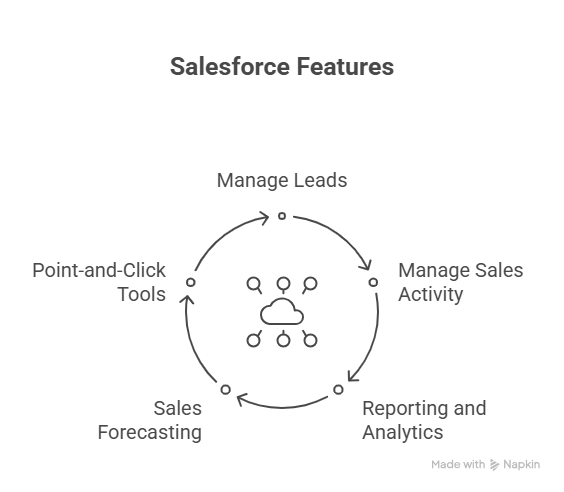Salesforce and Oracle, both renowned in the enterprise software industry, offer robust solutions tailored to meet diverse business needs.
This comparative analysis, specifically designed for business professionals and decision-makers, examines the oracle sales cloud vs salesforce debate in depth, exploring their strengths, weaknesses, and unique features.
When evaluating salesforce vs oracle platforms, understanding the nuances between these enterprise giants is crucial for organizational success.
This guide provides comprehensive insight into the oracle sales cloud vs salesforce comparison, examining key aspects such as features, integrations, contracting, support, and user experience to help you make an informed decision about which CRM platform best serves your business objectives.
Salesforce vs. Oracle Features
Salesforce Service Cloud (SSC) Features
The SSC combines with several comprehensive Salesforce 360 platform components to create a powerful sales solution.
When comparing salesforce and oracle, Salesforce’s intuitive interface stands out through the Lightning experience, leveraging vital mobile application accessibility.
The Salesforce AppExchange solutions page allows users to choose from various customizations and take advantage of a well-established user community.
Working with a Salesforce managed service provider or consulting partner gives you a better understanding of the platform’s capabilities.
The key features of the Salesforce sales cloud include the following:
- Managing leads and opportunities
- Managing sales rep activity (email, calls, tasks)
- Reporting and analytics
- Sales forecasting
- Point-and-click tools
Oracle Sales Cloud (OSC) Features
The Oracle Sales Cloud offers a comprehensive sales planning and performance management solution.
In the Oracle vs Salesforce features debate, Oracle’s strength lies in its enterprise-grade capabilities.
The OSC integrates with different applications (HCM, ERP) to provide a better, more unified view.
The Oracle Sales Cloud also has a solid knowledge base and various self-service capabilities.
For enterprise-level comparisons, don’t miss the Salesforce and SAP CRM comparison.
The key features of the Oracle Sales Cloud include:
- Lead and opportunity management
- SPM functionalities (commission structures, goal setting)
- Social selling tools
- AI-driven advanced analytics
- Territory and quota management
In the salesforce vs oracle debate, Salesforce is more accessible to use with wide adoption, but if you’re also exploring options like Zoho, you might want to check out the Salesforce and Zoho CRM comparison to see how both platforms cater to small businesses.
Opinions on Salesforce vs. Oracle Sales Cloud vs. Microsoft Dynamics
byu/stupidthrowaway11111 insalesforce
Salesforce Integrations
When evaluating oracle crm vs salesforce integration ecosystems, Salesforce is renowned for its integration abilities, which allow it to connect various services and applications to optimize workflows.
The most common Salesforce integrations include:
- Salesforce AppExchange: An application and integration marketplace with up to 5000 integrations for applications such as Google Drive, Zapier, DocuSign, automation tools, etc.
- Salesforce Open APIs for developers to build personalized integrations for specific use cases.
- Salesforce Lightning Connect allows data exchange between Salesforce and third-party applications.
Oracle Integrations
Oracle’s robust platform offers comprehensive integrations as well. In the oracle vs salesforce integration comparison, Oracle does just as good a job but differs slightly from Salesforce.
Oracle sales cloud integration include:
- Oracle pre-built connectors for different cloud services operating inside the Oracle cloud ecosystem (HCM, ERP). This results in seamless data flow. Salesforce integrations can also support health-specific tools like Salesforce Patient 360 for a unified view of patient data.
- Developers use Oracle Open APIs to build custom integrations for various use cases.
- The Oracle Integration Cloud is a powerful platform for data transformation, application building, and complex workflows.
In the oracle crm vs salesforce integration debate, Salesforce is ideal if you work with several third-party applications thanks to AppExchange. Learn more about Salesforce integration services for seamless connectivity.
Oracle integrations are better when you’re investing in the Oracle cloud infrastructure.
Oracle Service Cloud vs Salesforce: Evaluation & Contracting
Before choosing between salesforce and oracle, you should know which best suits your needs.
This section expounds on the evaluation framework when deciding between the two platforms.
Salesforce Evaluation & Contracting
With Salesforce, here is the framework to follow:
- Understanding your CRM needs and functionalities (Opportunity tracking, lead management, reporting, etc.)
- Consider mobile accessibility, ease of use, and team adoption. Salesforce consulting services should have the answers you need.
- Consider the required customization and sift through the Salesforce AppExchange library to find what you want.
- Look into whether Salesforce AppExchange has the required integrations or if you need open APIs to do the job.
- Consider future growth and whether Salesforce is the right option for you. If you are in the health sector, the Salesforce Health Cloud complete guide provides additional insights.
- Consider Salesforce pricing (user licenses, editions, applications) and see if it fits your budget.
- If you’re comparing enterprise-grade CRMs, review the enterprise CRM comparison Salesforce and Microsoft Dynamics to see how both platforms support large-scale operations.
- Consider working with expert Salesforce implementer for the best results.
When contracting Salesforce services, here is what to do:
- Pick a Salesforce edition (essentials, professional, enterprise, etc.). Each has different features and pricing, so choose one that best aligns with your needs.
- Speak with a Salesforce implementation service provider to negotiate pricing, licensing, and contract terms.
- Before signing, review each contract detail, service level agreements, and timelines.
Oracle Evaluation & Contracting
When evaluating oracle sales cloud vs salesforce, here is the Oracle framework to follow:
- Determine your CRM needs and decide whether the Oracle Sales Cloud has all the necessary functionality.
- Audit your IT environment and determine whether it integrates well with Oracle Cloud.
- Evaluate your sales process and determine whether you need Oracle’s advanced functionality (AI, SPM).
- Keep future growth and expansion plans in mind and consider Oracle’s scalability.
- Educate yourself on Oracle’s pricing (licensing, modules, OIC usage) to see if it fits your budget.
Salesforce has a more straightforward evaluation process, AppExchange, and a broader user base.
Oracle is better suited for complex needs, leveraging Oracle cloud integrations and features like (AI and SPM).
Oracle Service Cloud vs Salesforce: Service and Support Systems
Once you’ve signed up, you want to know about the platform’s service and support. This section explores the oracle service cloud vs salesforce support systems for their customers.
Salesforce Service And Support
To see how Salesforce Service Cloud compares with other helpdesk tools, explore the Zendesk and Salesforce Service Cloud comparison.
The Salesforce development services vary depending on specific products and their licensing plans.
These plans include:
- Premier Support: The highest level comes with 24/7 phone support, dedicated account management, and proactive problem-solving features.
- Premier Success Plan: Adds onto premier support with strategic guidance, access to training programs, and customer success managers.
- Standard support Plan: This plan comes with licenses, an online knowledge base, web self-service, and phone or chat support (during business hours).
- Salesforce Trailhead: A free online learning portal with various courses, certifications, and learning modules. For businesses focused on revenue generation, consider this Salesforce Revenue Cloud implementation guide.
Oracle Service And Support
In the oracle service cloud vs salesforce support comparison, Oracle also offers tiered plans, each dependent on products and licensing. These plans include:
- Diamond Service: This plan offers best-in-class support 24/7. Users can access Oracle’s support engineers, dedicated account management, and proactive issue identification.
- Platinum Service: This plan includes a business-hour phone line, chat support, an Oracle knowledge base, and update/patch notifications.
- Global Customer Support offers the standard support tier, which includes an online knowledge base, web self-service, and business-house phone support.
- Oracle University: This offers Oracle certifications and training programs and includes the Oracle Sales Cloud.
- For organizations evaluating enterprise-level service platforms, the ServiceNow versus Salesforce comparison guide can help highlight key differences in ITSM and customer service capabilities.
For organizations evaluating enterprise-level service platforms, the ServiceNow versus Salesforce comparison guide can help highlight key differences in ITSM and customer service capabilities.
Oracle CRM vs Salesforce: Final Verdict
The comprehensive comparison between oracle sales cloud vs salesforce reveals that both platforms offer powerful tools and functionalities to elevate business operations.
When deciding between salesforce vs oracle, consider that Salesforce excels in user-friendly interfaces and cloud-based flexibility, while Oracle stands out for its robust database management capabilities and comprehensive enterprise solutions.
By understanding the oracle crm vs salesforce strengths and limitations, businesses can make informed decisions to optimize their digital strategies and drive sustainable growth in today’s competitive landscape.
The salesforce and oracle platforms each serve different organizational needs, making your specific requirements the ultimate deciding factor.
FAQs
Is Oracle Sales Cloud vs Salesforce – Which is Better?
In the salesforce vs oracle comparison, Salesforce is easier to use, more commonly adopted, and comes with strong CRM features. For hands-on support, you can hire a Salesforce developer to tailor CRM solutions to your business. However, Oracle excels in complex enterprise environments with extensive database requirements.
Does Salesforce Still Use Oracle?
No, Salesforce uses its own cloud infrastructure. In the salesforce and oracle relationship, they are now competitors rather than partners, with each maintaining separate cloud platforms.
Who is the Biggest Competitor of Oracle in CRM?
In the oracle crm vs salesforce market battle, Salesforce is Oracle’s biggest competitor in the CRM space, holding significant market share and offering comprehensive cloud-based solutions.
What’s the Main Difference Between Oracle Service Cloud vs Salesforce Service Cloud?
The oracle service cloud vs salesforce comparison shows that Salesforce Service Cloud offers more intuitive user interfaces and extensive third-party integrations through AppExchange, while Oracle Service Cloud provides deeper integration with Oracle’s enterprise ecosystem and advanced AI capabilities for complex service operations.

Navaid Ahmed
Director Of Engineering at Folio3 Software | Head of Product Management
Navaid Ahmed is a Seasoned Salesforce CRM expert, who brings a wealth of experience in optimizing sales processes, enhancing customer relationships, and driving business growth. With a deep understanding of Salesforce's capabilities, Navaid specialize in crafting tailored solutions that empower organizations to streamline operations, boost productivity, and achieve their sales objectives.

